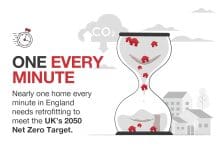Social housing providers have targets to bring their housing stock to an EPC rating of C or better by 2030. Gary Cawley, director of CPC, discusses the need to bring tenants along on the net zero journey
Last month the government announced the next stage of the Social Housing Decarbonisation Fund, making £160m available for social housing providers to upgrade existing housing stock and to improve energy performance by 31 January 2023.
And in the run up to COP26, we’re still eagerly awaiting the long-promised Heat and Buildings Strategy, building on the government’s 10 Point Plan for a Green Industrial Revolution, to give clearer guidance on exactly how housing providers, homeowners and builders should reduce carbon emissions from homes.
There’s also been much wrangling in the media about the government’s gas boiler ban, all part of the roadmap towards the Future Homes Standard. Will the government stick to its guns about banning the sale of new gas boilers from the mid-2030s? Or will it instead rely on households making the choice to switch to heat pumps or other forms of electric heating by themselves, by nudging them on pricing? And what about new homes? Will the Committee on Climate Change recommendation to ban all new homes from being connected to the gas grid by 2025 come to fruition?
Some of the answers should be with us soon, but in the meantime, social housing providers still have targets to bring their housing stock to an EPC rating of C or better by 2030.
As discussed in my article last month, more than four million homes in the North need to be upgraded to reach an Energy Performance Certificate (EPC) level C. And whatever your views about the tactics used by Insulate Britain in recent demonstrations, without adequate insulation for our homes we will still be pouring carbon into the atmosphere and continuing to over-heat the planet.
A huge change for tenants
All of this is going to mean a huge change for tenants, both in terms of understanding why the upgrades need to be made to their homes and also getting to grips with how new technologies should be used.
The amount of jargon around net zero is astounding. From net zero to carbon neutral, to embodied carbon to operational carbon, through to air source and ground source heat pumps, hydrogen boilers and photovoltaic panels – these are all technologies and terminologies that remain a mystery to many people.
And despite all the hype, I hear that YouGov research commissioned by Home Group found that nearly two-thirds of social housing residents have never even heard of the term ‘net zero’.
More broadly, a poll of 2,000 people living in all types of housing discovered that while 80% felt environmental sustainability is important, they were less sure about how their homes would need to change.
This confusion and concern from residents has led to consumer organisations Citizens Advice and Which? recently joining the Federation of Master Builders and the Aldersgate Group in an open letter to the Prime Minister, calling on the government to do more to help people decarbonise their homes, including by providing better information.
Critically, the letter stated:
“Many people have difficulty understanding what home technologies to install. There is too little information about the different options available and the benefits they’re intended to deliver. People need accessible, unbiased guidance on the changes needed for their homes and how to make them.”
The letter also highlighted the need for the government to put in place adequate consumer protection for those embarking on upgrades to their homes, along with financial support for people who are fuel-poor, vulnerable or less able to afford the works.
There is clearly a huge gap in knowledge and understanding of what role we can all play in reducing carbon emissions.
Closing the knowledge gap
In an attempt to address this lack of information and understanding, our partners at the Northern Housing Consortium (NHC) have launched their Social Housing Climate Jury. Together with partners Karbon Homes, Thirteen Group, Yorkshire Housing, Salix Homes, and First Choice Homes Oldham, NHC are working to understand how tenants, social housing providers and others can work together to tackle climate change in our homes and neighbourhoods.
The Jury has brought together a representative and inclusive group of social housing tenants to learn from and question invited experts, to undertake personal and group reflection, where possible to reach consensus, and to deliver a mandate for action that can be taken up by the sector at large.
The group has been meeting online over 10 weeks since July to explore views on retrofit, specific measures and any preference for how these interventions should be implemented in their homes and neighbourhoods.
The findings will be revealed at the Northern Housing Summit on 2 and 4 November. Early indications suggest residents want to know how being more energy efficient will save them money and keep them warmer
Meanwhile, if you’re taking the first steps to retrofit your housing stock, consider using CPC free to use frameworks such as our Energy Efficiency Consultancy Services (N8C) framework, which covers local suppliers who are able to provide energy surveys and recommendations.
Together with the Energy Efficiency Measures and Associated Works (N8) framework, which includes specialist installers in insulation and heating, this approach is simple to use, fast and efficient meaning you have a compliant procurement route to access local companies who are proven to have the necessary knowledge and expertise.














